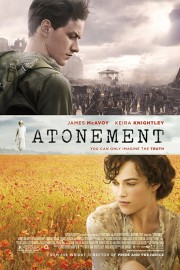Atonement
This is a film of lost chances and life-long regret. It’s about the ways in which we try to put things right, even when the opportunity has long past. In the end, it’s about two acts- interconnected- that destroy the lives of three people. That only one of these acts is ever really dealt with is, I think, a fundamental flaw of the story of Ian McEwan’s novel, and one that carries over in the acute screenplay by Christopher Hampton. I guess, however, to acknowledge within the story the second act or mistake (in actuality, it’s the first one that occurs) might lose the story’s focus. It doesn’t lessen the film’s impact- just lingers as something that should perhaps have been dealt with.
Dario Marianelli’s score assists director Joe Wright (who debuted with his pleasant 2005 adaptation of “Pride & Prejudice”) brilliantly in following McEwan’s epic story of lost love and a life-long search for forgiveness. To some, his music will reek of pretentious artiness, but for me, the “V for Vendetta” composer deftly captures the roiling emotions of McEwan’s story with a musical poetry that brings to mind the greatest composers. This is musical storytelling of the highest order, in a year when many composers brought their A-game (including Marianelli’s own score for “The Brave One”), but few inspired my passions for the field. Marianelli’s soars with heart-breaking feeling and the excitement of something invigorated from within.
I wish I could say the same for the film as a whole. While the story is a fascinating internal journey for its’ heroine, and Wright and his collaborators see the story with vivid clarity, the storytelling feels overbearing and stagey, as it is with many Oscar-bait period pics (“The Hours” anyone?). There are several moments where the film comes alive under Wright’s astute direction- especially in a complex tracking shot (the highpoint of cinematographer’s lush eye) about five and a half minutes long as it follows Robbie (played with lustful vigor, yet tortured romanticism, by James McAvoy) along the beaches of France, disillusioned by the images of war around him- and Wright’s command for McEwan’s formal complexity deserves comparison with the masters. But two films is too early to declare a director a master (as some critics- myself included- are prone to do), and though his work thus far doesn’t exactly excite me, I’m curious to where he’ll move onto in future films.
“Atonement” provides many challenges for Wright and Hampton- the two sidestep many potential landmines in the telling of the story of Briony Tallis, whom we first meet at age 13 (and is played at that tender age by Saoirse Ronan in a stellar performance deserving of Oscar’s attention). At this time, she is a talented young writer whose latest is being performed by the family after a family dinner for her brother’s return to the homestead, where her older sister Cicilia (a luminous Kiera Knightley, deftly showing both the character’s serious feelings and carnal desires) has a careful flirtation with Robbie (who works as a servant for the family). A moment- witnessed by Briony from her bedroom window- between Cicilia and Robbie by the fountain sets into motion the events that will haunt all three lives forever. That moment leads to Robbie’s pounding out of a letter to Cecilia bringing to the forefront his desire for her in the most vulgar way. How that letter makes its’ way into Briony’s impressionable hand, I won’t divulge, although its’ impact on her leads to false accusations of violence, prison for Robbie, and familial exile for both Cecilia, after the revelation of their affair is divulged, and Briony, who’ll be forever looking to make things right even after war and age take their toll on all three.
What’s most surprising about “Atonement” is how clearly the film is about Briony, as it is her we will follow as she grows older and more regretful, first as a nurse in World War II (now played by a memorably troubled Romola Garai, whose comforting of a dying French soldier is one of the film’s perfect moments), later still as an old woman (the marvelous Vanessa Redgrave, only in a few scenes but absolutely unforgettable) whose final book is an attempt to heal both the past and her tortured soul. We see glimpses of Robbie and Cecilia after that fateful night, as they go about life without one another, but the film teases us with the notion of wish fulfillment before hitting us with the harsh truth of reality. In the end, there’s not a lot to dislike about “Atonement.” You won’t be able to take your eyes off of it, although you may hope it would speed up a little bit.










